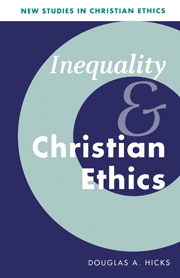Book contents
- Frontmatter
- Contents
- List of figures and tables
- Acknowledgment
- General editor' preface
- Preface
- List of abbreviations
- PART ONE CONTEXTUALIZING INEQUALITY
- PART TWO CONSTRUCTING A CHRISTIAN ETHICAL APPROACH
- 5 Christian ethics and theology in a pluralistic society
- 6 Equality before God in the thought of H. Richard Niebuhr
- 7 Equality before God in the thought of Gustavo Gutiérrez
- 8 Solidarity selfhood, and social goods
- PART THREE TRANSFORMING DISCOURSE, PERSONS, AND SOCIETIES
- Appendix A The Gini coefficient, inequality, and value-claims
- Appendix B Constructing Gini coefficients in income, education, and health/longevity
- Appendix C The construction of the HDI and the IAHDI
- Bibliography
- Index
5 - Christian ethics and theology in a pluralistic society
Published online by Cambridge University Press: 05 June 2012
- Frontmatter
- Contents
- List of figures and tables
- Acknowledgment
- General editor' preface
- Preface
- List of abbreviations
- PART ONE CONTEXTUALIZING INEQUALITY
- PART TWO CONSTRUCTING A CHRISTIAN ETHICAL APPROACH
- 5 Christian ethics and theology in a pluralistic society
- 6 Equality before God in the thought of H. Richard Niebuhr
- 7 Equality before God in the thought of Gustavo Gutiérrez
- 8 Solidarity selfhood, and social goods
- PART THREE TRANSFORMING DISCOURSE, PERSONS, AND SOCIETIES
- Appendix A The Gini coefficient, inequality, and value-claims
- Appendix B Constructing Gini coefficients in income, education, and health/longevity
- Appendix C The construction of the HDI and the IAHDI
- Bibliography
- Index
Summary
What does Christian ethics have to say in the wider public debate about inequality? Should theologically informed perspectives be involved in a discussion that is clearly political, social, and economic? Does Christian ethics have anything distinctive to contribute? Why should, or should not, people of faith care about the inequalities described in the previous chapters?
In considering these questions, one must shift the inquiry from the empirical analysis of inequality to analyze, from a Christian ethical perspective, how such inequalities matter morally and theologically. It is conceivable for Christians to read the previous chapters and then respond that Christian faith has little direct relevance to those issues – and that conversely, inequalities have little relevance for Christian faith and practice. Indeed, the Christian commitment to the equality before God has often operated as a “spiritual truth” while offering little impetus to move Christians to denounce even severe forms of social inequality – including slavery.
How Christians interpret the “meaning” of equality is closely related to a wider theological question: what kind of involvement should Christians have in the “world's problems”? Some theologians and ethicists maintain that Christians have been sidetracked from their principal task of worshiping God by trying to “make the world turn out right.” Others disagree and promote various forms of “world-transformative Christianity.”
Finally, there is a philosophical (and sociological) question that Christian perspectives should consider if they are to engage in a wide public debate on inequality.
- Type
- Chapter
- Information
- Inequality and Christian Ethics , pp. 85 - 113Publisher: Cambridge University PressPrint publication year: 2000



